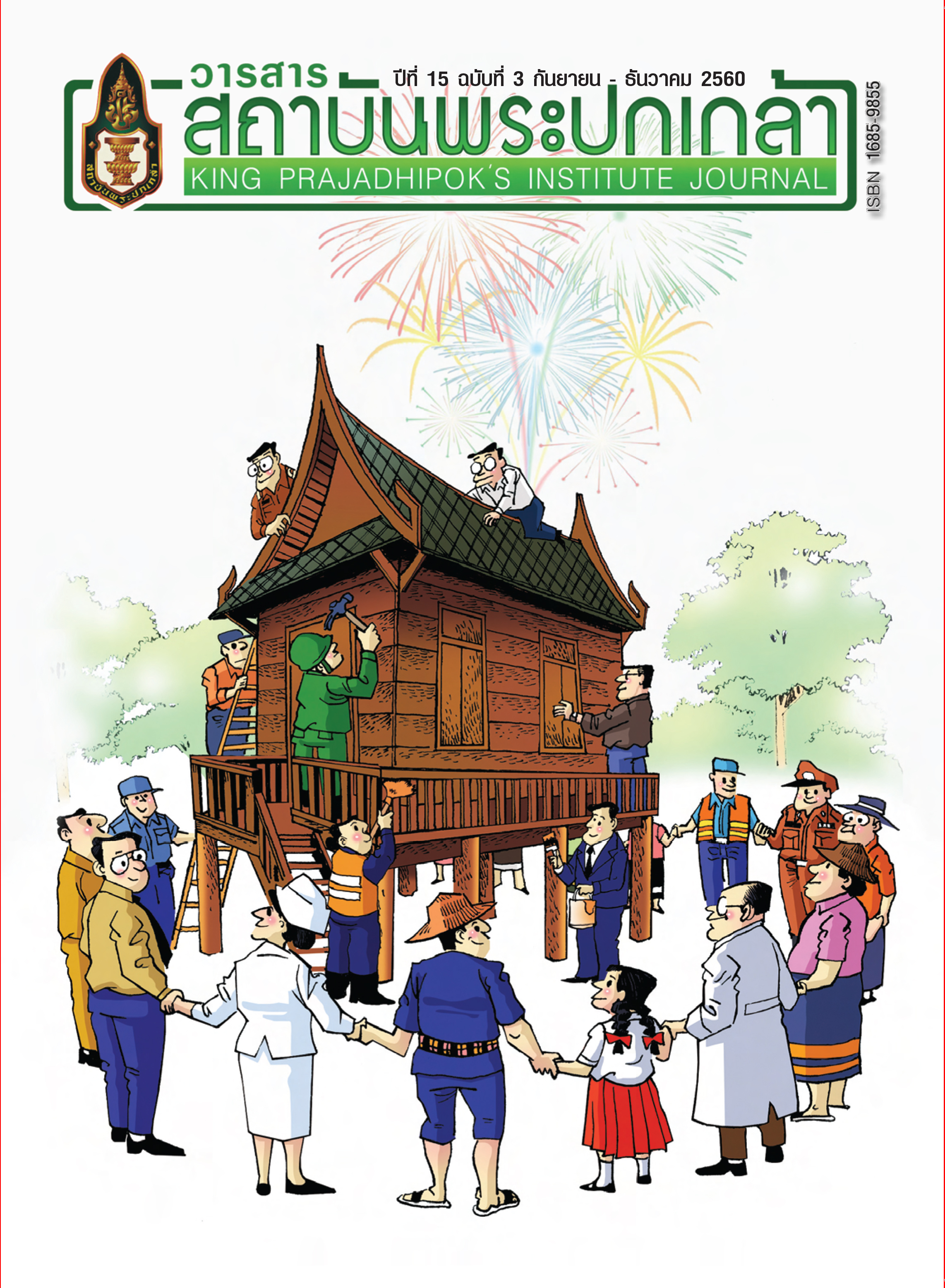Phayao People’s Opinions concerning the 2014 Military Coup
Main Article Content
Abstract
This research aims to survey Phayao people’s opinions concerning Thailand’s 22 May 2014 military coup. The study employs mixed methodology. Quantitative data were collected using questionnaires in three different periods: one month after the coup, three months after the coup, and six months after the coup. Employing quota sampling, Phayao people in all districts were selected. Meanwhile, focus groups and interviews were carried out to collect qualitative data during periods six and nine months after the coup. The interviewees and participants are selected by purposive sampling and snowball technique. It is found that, at the beginning of post-coup period, most respondents felt glad that the coup took place. They believed that the coup helped resolve political conflicts, restored national solidarity, and relieved stresses in daily life. Later on, however, people of Phayao became indifferent and less content. The main reason stated was continuing problems in economic development and household consumption. Besides, this research concludes that: (1) various kinds of fears, such as fears of guilt, fear of the military, and fear of change in daily life, were evident after the coup; (2) political culture
in the North could be characterized with shyness, introversion, peace-loving, and yet resisting; and (3) the colour of Phayao politics is rather mixed.
Article Details
@ 2020 King Prajadhipok's Institute The Government Complex Commemorating All Right Reserved.
References
ไชยวัฒน์ ค้ำชู และ นิธิ เนื่องจำนงค์. (2559). การเมืองเปรียบเทียบ:ทฤษฎี แนวคิด และกรณีศึกษา. กรุงเทพฯ: สำนักพิมพ์แห่งจุฬาลงกรณ์ฯ.
ข่าวสด (2557). โรดแม็ป “คสช.” - 3 เดือนที่ต้องจับตา. ข่าวสด. กรุงเทพฯ, สำนักพิมพ์มติชน.
คมชัดลึก. (2557). จักรภพดิ้นสู้ คสช., คม ชัด ลึก.
จิระพงษ์ เต็มเปี่ยม. (2557). Road Map ของ คสช., แนวหน้า. Retrieved from http://www.naewna.com/politic/columnist/12815 สืบค้นเมื่อ 8 มิถุนายน 2557
ThaiPBS. (2557). รัฐประหารกับสื่อโซเชียลมีเดีย. www. http://m.news.thaipbs.or.th/
แนวหน้า. (2554, 3 มิถุนายน 2554). แดงพะเยาขอตรวจสอบเลือกตั้งภาคประชาชน, แนวหน้า.
ปภาวดี ดุลยจินดา. (2540). “ทัศนคติและความพอใจ”. ใน เอกสารการสอนชุดวิชาพฤติกรรมมนุษย์ในองค์การ หน่วยที่ 8-15. นนทบุรี: มหาวิทยาลัยสุโขทัยธรรมาธิราช.
ประชา เทพเกษตรกุล. (2535). การแทรกแซงทางการเมืองของทหารไทย: ศึกษาเฉพาะกรณีรัฐประหาร เมือวันที่ 23 กุมภาพันธ์ 2534. รัฐศาสตรมหาบัณฑิตสาขาการเมืองการปกครอง. มหาวิทยาลัยธรรมศาสตร์.
ประทีป ธรรมรักษ์. (2535) ทัศนคติทางการเมืองของนายทหารต่อการรัฐประหาร: ศึกษากรณีนายทหารนักเรียน โรงเรียนเสนาธิการทหารบก โรงเรียนเสนาธิการทหารเรือ โรงเรียนเสนาธิการทหารอากาศ ปีการศึกษา 2535. ศิลปศาสตรมหาบัณฑิต รัฐศาสตร์ มหาวิทยาลัยรามคำแหง.
ประภาเพ็ญ สุวรรณ. (2537). การจัดสถานะทางสุขภาพ: การสร้างมาตราส่วนประมาณค่าและแบบสอบถาม. กรุงเทพมหานคร: ภาพพิมพ์.
ปริญญา อุดมทรัพย์. (2514). วิเคราะห์บทบาททางการเมืองของทหารในประเทศไทย. รัฐศาสตรมหาบัณฑิต การเมืองการปกครอง จุฬาลงกรณ์มหาวิทยาลัย.
ผู้จัดการ. (2555). “เสื้อเหลือง-เสื้อแดง-ปชช.พะเยา” ร่วมเวทีออกแบบอนาคตไทยพร้อมหน้า, ASTV ผู้จัดการออนไลน์. สืบค้นเมื่อ 16 ธันวาคม 2555.
ผู้จัดการ. (2557a). We supoort Thai Army “เคียงไหล่ประชาชน หัวใจคุณหล่อมาก”, ผู้จัดการรายวัน. สืบค้นเมื่อ 23 พฤษภาคม 2557.
ผู้จัดการ. (2557b). โพลปลื้มประยุทธ์ 3 เดือนผลงานเจ๋ง ยกนิ้วแก้ปัญหาพลังงาน, ผู้จัดการรายวัน. สืบค้นเมื่อ 29 ธันวาคม 2557.
พงศ์ หรดาล. (2540). จิตวิทยาอุตสาหกรรมและองค์การเบื้องต้น. กรุงเทพฯ: ม.ป.ท.
โพสต์ทูเดย์. (2557, 5 มีนาคม 2557). เหลือง-แดง พะเยา จับมือต้านแยกประเทศ, โพสต์ทูเดย์.
พิชิต พิทักษ์เทพสมบัติ. (2543). โพลและสังคม (ครั้งที่ 2 ed.). กรุงเทพฯ: เสมาธรรม.
มติชน. (2554a). แดงพะเยาจัดวันเกิดให้แม้ว, มติชน. สืบค้นเมื่อ 20 กรกฎาคม 2554.
มติชน. (2554b). ‘โสภณ’ หลบแดงพะเยารอไล่, มติชน. สืบค้นเมื่อ 12 มีนาคม 2554.
มติชน. (2555a). เปิด 13 หมู่บ้านแดง ‘พะเยา’, มติชน. สืบค้นเมื่อ 8 มกราคม 2555.
มติชน. (2555b). พะเยาเล็งตั้ง ‘อำเภอแดง’ ที่แรก, มติชน. สืบค้นเมื่อ 26 กุมภาพันธ์ 2555.
ลิขิต ธีรเวคิน. (2554). วิวัฒนาการการเมืองการปกครองไทย. กรุงเทพฯ: สำหนักพิพม์ มหาวิทยาลัยธรรมศาสตร์.
ศักดิ์ไทย สุรกิจบวร. (2545). จิตวิทยาสังคม. กรุงเทพฯ: สุวีริยาสาส์น.
สงวน สุทธิเลิศอรุณ และคณะ. (2522). จิตวิทยาสังคม. กรุงเทพฯ: ชัยศิริการพิมพ์.
สมหมาย วิชาวรณ์. (2543). ทหารและวิสัยทัศน์ทางการเมือง. กรุงเทพฯ: สถาบันพระปกเกล้า.
เสนอ จันทรา. (2517). สาเหตุของการยึดอำนาจในประเทศไทย (พ.ศ. 2454-พ.ศ. 2514). รัฐศาสตรมหาบัณฑิต การเมืองการปกครอง มหาวิทยาลัยธรรมศาสตร์.
โสภา ชูพิกุลชัย. (2522). จิตวิทยาสังคมประยุกต์. กรุงเทพฯ: ไทยวัฒนาพานิช.
สันทัด กรณี. (2557). จับทวนสวนกระแส: ผู้นำจากล้านนา, โพสต์ทูเดย์. สืบค้นเมื่อ 5 มีนาคม 2557.
สุขุม เฉลยทรัพย์. (2557). ‘การเมือง’ เรื่อง ‘คลายกังวล...กังวล’ ของ ‘ประชาชน’...!, สยามรัฐ.
สุรพัศม์ นำลอง. (2554). บทบาทหน่วยรบพิเศษในการรัฐประหารในช่วงปี พ.ศ. 2509 - 2549. รัฐศาสตร์มหาบัณฑิต การเมืองการปกครอง มหาวิทยาลัยเชียงใหม่.
อรุณ รักธรรม. (2540). การพัฒนาและฝึกอบรม: ศึกษาเชิงพฤติกรรม. กรุงเทพฯ: คณะรัฐประศาสนศาสตร์ สถาบันบัณฑิตพัฒนบริหารศาสตร์.
ALPERT, H. (1952). Opinion and Attitude Surveys in the U.S. Government. Public Opinion Quarterly, 16 (1), 33-41. doi: 10.1086/266365.
Fishbein, M., & Ajzen, I. (1975). Belief, Attitude, Intention and Behavior: An Introduction to Theory and Research. Boston: Addison-Wesley.
Flemimg, D. (1967). “Attitude: The history of a concept”. Perspective in American History. 1, 287-365.
Gibson, J. (2000). Organizations, Behaviour, Structure, Processes (9th ed,). New York: McGraw Hill.
Insko, C. A, (1976). Theories of Attitude Change. New York: Appleton-Century-Crofts.
Katz, D. (1960). “The Functional Approach to the Study of Attitudes.” Public Opinion Quarterly. 24, 163-204.
Krech, D., Crutchfield, R.S., & Ballachey, E.L. (1962). Individual in society.
Lee, A. M. (1947). “Sociological Theory in Public Opinion and Attitude Studies”. American Sociological Review. 12 (3), 312-323. doi: 10.2307/2086521.
Maassen, G. H. (1997). “An Application Of Structural Equation Modeling In Public Opinion Research: Conceptualizing Public And Opinions”. International Journal of Public Opinion Research. 9 (2), 146-169. doi: 10.1093/ijpor/9.2.146.
Newstrom, J. W. & Davis, K. (2002). Human Behaviour at Work: Organizational Behaviour (8th ed.). New York: McGraw Hill.
Rosenberg, M. J. (1956). “Cognitive structure and attitudinal affect”. The Journal of Abnormal and Social Psychology. 53, 367-372.
Rosenberg, M. J. (1960). “An analysis of affective-cognitive consistency.” In M. J. Rosenberg, C. I.
Hovland, W. J. McGuire, R. P. Abelson & J. W. Brehm (Eds.), Attitude organization and change. Yale University Press.
SAAR, A., & JOE, L. (1992). “Polling, Under The Gun: Political Attitudes In Estonia, Surveyed At The Height Of The Soviet Coup Attempt, August 1991”. Public Opinion Quarterly. 56 (4), 519-523. doi: 10.1086/269341.
Thurstone, L. L. Comment. American Journal of Sociology. 52, 39-50.
Triandis, H. C. (1971). Attitudes and Change. New York: Wiley.


